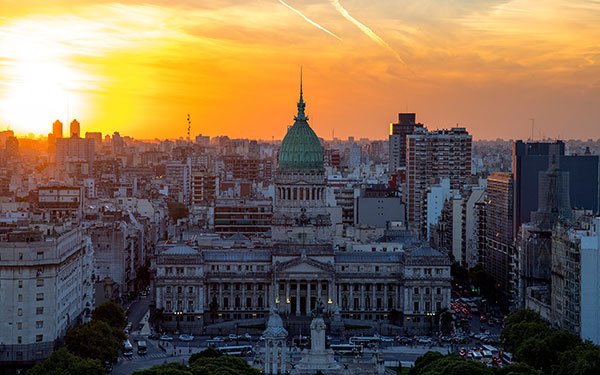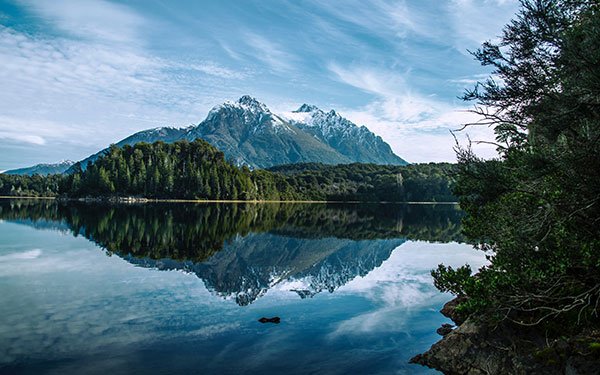Are you considering moving to Argentina from the UK?
As the saying goes — it takes two to tango — and there’s nowhere better to do it than beautiful and bounteous Argentina. But apart from being the birthplace of one of the world’s most famous and passionate dances, what does Argentina have to offer British expats?
The 8th largest country in the world, Argentina is a land of natural wonders filled with fantastic mountains, forests, rolling deserts and tundra, verdant jungle, rivers and waterfalls, and fringed by warm, sparkling oceans.
In contrast to this abundance of natural splendour, the sprawling modern metropolis of Buenos Aires slaps the senses with its sensuality, vibrant style, electric nightlife, and gourmet cuisine.
Smaller towns and cities offer a slice of true Argentinian culture and warm hospitality, with backyard barbecues, excellent wine, and of course, football.
Sound tempting? You bet it does. If you want to join the thousands of expats already living the good life in Argentina, here’s everything you need to know to get you there…
Contents
Argentina Visa Requirements for Brits
Visiting
Brits are some of the lucky few that don’t need to apply for a tourist visa before entering Argentina.
On arrival at the airport, British passport holders receive a stamp that entitles them to 90 days stay in the country for tourism purposes.
Once your 90 days is up, you can then apply for a visa extension for a further 90 days. If you wish to stay after this time, you’ll need to exit and re-enter Argentina on a new tourist visa which can then also be extended.
After this further extended period, it is possible to exit and re-enter the country again multiple times in order to obtain new 90 day tourist visas, but without the benefit of visa extensions.
If you want to enter Argentina on a tourist visa, make sure that your passport has at least 6 months left to run, with blank pages ready to be stamped.
Working
If you’re intending to work in Argentina for 3 months or more, it is necessary to apply for a temporary work visa which will also entitle you to temporary residency.
You can do this with your existing tourist visa, but you’ll also need to pass criminal records checks in both Argentina and the UK, provide a verification of residence obtained from your local police station, and a letter of employment from your Argentinian employer stating that they intend to hire you for 1 year or more.
All of the above should be taken to the immigration office, which will supply you with a temporary work visa which must then be used for your employer to officially hire you, after which you must return to the immigration office to get your work permit finalised and stamped.
Permanent Residency
Whilst gaining temporary residency is fairly straightforward, gaining permanent residency can be a lot more hassle for UK expats.
The Argentinian government are relatively tough on who they accept into the country on a permanent basis, and Brits will need to already be in possession of a work or temporary residence visa, provide a certificate of good conduct and proof of funds, and be willing to make a financial contribution of 1,500,000 Argentine Pesos in production, commercial or service activity.
Way of Life in Argentina
Lifestyle
Argentinian culture is heavily influenced by European countries due to the fact that the vast majority of Argentinians are descended from European immigrants.
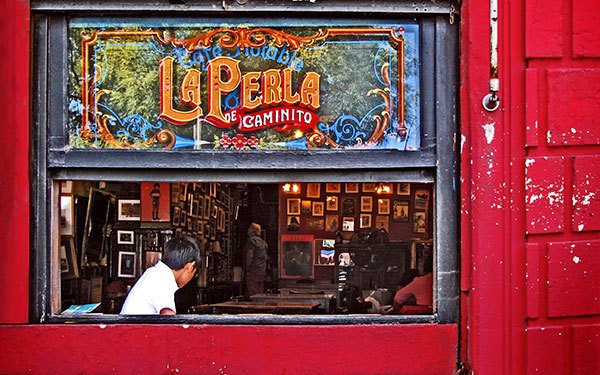
This, blended with South American customs, traditions and innovations, has given birth to a fun loving population who love life, art, sport, culture, and cuisine.
As an extremely gregarious and unreserved bunch, Argentinians spend a lot of time socialising. Social life mainly takes place outdoors, on the streets or in bars, cafés, restaurants and nightclubs.
Food is a hugely important part of the Argentine lifestyle, and there are traditionally 4 meals a day which act not only to nourish the body but also as a chance to catch up with family and friends.
The country’s cuisine is legendary — especially the beef dishes — and delicious grilled meats grace plates daily, as well as a host of Mediterranean (notably Italian and Spanish) influenced dishes such as pizza and pasta, empanadas, meaty stews, quiche-like tartas, and creamy Dulce de Leche.
The arts are also integral to the way of life here. Argentinians are fiercely proud of their unique culture, and there are copious amounts of theatres, galleries, operatic performances, contemporary music, and dancing to be enjoyed.
Getting Around
Argentina is an immense country, so it’s fortunate that there is a good air transport infrastructure in place to travel the long distances between the major cities.
Domestic flights save huge amounts of time but can be expensive — especially for foreigners who pay more for their tickets than the locals — and flights are prone to changes, delays, and cancellations.
If you’re intending to spend a lot of time exploring the country by air, it’s worth investing in an air pass such as the Visit Argentina Air Pass by Areolineas, which can save you significant amounts of cash for multiple flights over a 90 day period.
Bus travel has the major plus of offering scenic views to occupy your time, as well as being a relatively affordable and reliable way to travel.
There are hundreds of private bus companies covering routes all around the country. Long distance buses are comfortable with toilets, film entertainment, food and drink, and reclining seats on the overnight services. Tickets can be bought on the spot or online.
Rail travel is not recommended as the state of the railways is poor, with little in the way of long distance services, although there are some interesting tourist trains available offering routes through spectacular natural landscapes.
In the cities there are a few different ways to get around. Local buses offer a cheap way to get from A to B, but bus routes can be complex and difficult to get your head around.
Buses in most cities require cash payment upon boarding, with the exception of major ones like Mendoza and Buenos Aires where it is necessary to buy a transportation card a bit like a travel card.

Taxis are another option, and popular with the locals as they are very convenient, fairly cheap and digitally metered.
You can simply hail a cab on the street, but if you want some additional security you can telephone for a reliable ‘remises’ taxi which offer various fixed fare routes.
Buenos Aires is currently the only Argentinian city to have a metro system in place. It’s a very fast, cheap and reliable way to explore the city.
Driving in Argentina
Roads in big cities can be very frustrating, so it may be wiser to rely on public transport.
If you’re looking to explore further afield however, a car can be a great way to get around.
UK driving licence holders must apply for an international driving license before hitting the road in Argentina, and if you’re a Brit intending to live here permanently you’ll be required to apply for a an Argentinian license.
The majority of Argentinian roads are well maintained, although in rural areas some can become difficult to navigate – particularly in areas prone to heavy rain when they can become flooded.
Be aware that many Argentinians tend to flout the rules of the road, resulting in dangerous driving and a reasonably high mortality rate, and in certain areas levels of car crime are also high.
Be sure to keep a copy of your car insurance documents with you at all times, as this will be verified should you be stopped at checkpoints.
Weather in Argentina
Being south of the equator, the seasons in Argentina are flipped compared to those in the UK, with summer starting in January.
Covering such an immense area, the climate here can vary greatly from place to place, but Argentina mostly enjoys a temperate climate most of the year round with a reasonable amount of rainfall.

In summer the north of the country sees sizzling temperatures and a humid atmosphere, and remains hot all year round with plenty of rainfall. In the south things can get very chilly — notably the Patagonian Andes — as well as experiencing storms and snow.
Less extreme, more temperate areas include Buenos Aires and the Pampas, which boast hot but sticky summers and cool, dry winters.
Cost of Living in Argentina
Recently recovering from a rather shaky economy, Argentina is nevertheless a relatively inexpensive place for British expats to live, being on average around a third cheaper than the UK.
However the cost of living in Buenos Aires and other big cities can be almost as expensive as cities in Europe.
Read on to find out more…
Lifestyle
Food and clothing costs about the same as back in Blighty, with the exception of markets and road side stalls selling local produce which are cheaper.
Dining out and drinking in Buenos Aires can be very expensive, although street food is cheap and tasty.
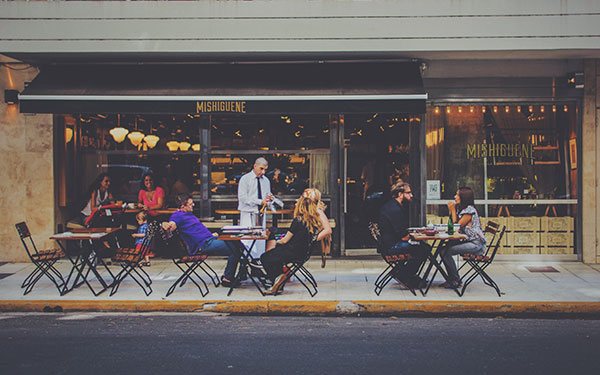
Car prices — even for second hand vehicles — can be costly, which is why most city dwelling expats prefer to hire a car for trips out of town.
Electrical goods are more expensive than the UK, so bring your own wherever possible.
Rent
When it comes to rent and utilities foreigners usually pay higher rates than the natives, and rates vary wildly from location to location making it very difficult to give an idea of cost.
Accommodation in rural areas is cheap, but in Buenos Aires you can expect to pay anywhere from the equivalent of £350 upwards for a room in a shared house in a good area.
Healthcare
Although UK expats living in Argentina can benefit from a certain level of free health care, it is recommended to take out a private healthcare plan which gives access to better facilities and shorter waiting lists for treatment.
That said, healthcare policies for expats in Argentina are usually limited to covering medical care received in the local area, so if you travel outside of your home town you may not be covered.
There are numerous different international health insurance providers offering policies at varying costs with affordable options available, and some private facilities offer their own healthcare insurance.
Alternatively if you choose not to take out a healthcare insurance policy but wish to visit private clinics you can simply pay the fees upfront.

Schooling
With a good reputation, the Argentinian public education system is one choice for expat families.
This is a good option for expats settling permanently, as lessons are taught in Spanish, giving kids young enough the chance to integrate better, although older children may find this tougher.
Alternatively there are a number of private or international schools in the cities, with the former offering a bilingual curriculum, and the latter teaching lessons in English to a UK style curriculum.
Fees for private education are expensive — especially in the case of international schools where fees can be as much as around £15,000 per year.
Popular Areas for Brits
Buenos Aires
The ultimate Argentinian city, buzzing Buenos Aires has attracted a large expat population with its European vibe and sexy style.
Colourful colonial buildings line the leafy streets, there are prime steak houses on almost every corner, and top night spots throb with life and music until the wee hours — not to mention to array of museums and galleries, world class wine, and fabulous shopping.
Here’s a great video covering the pros and cons of moving to Buenos Aires:
Cordoba
The majestic Río Suquia winds its way through the heart of this charming and historic city in the temperate Pampas.
Steeped in history yet thoroughly on trend, Cordoba is a fascinating mix of old and new, jumbling together vibrant nightlife and chic restaurants with fine museums and galleries and historical sites.
La Plata
A thoroughly modern city, La Plata is famous for its well laid out streets which create a star design, neatly connecting all the major plazas.
This is a university city and administrative centre, which despite its functionality boasts excellent nightlife, an enormous leafy park, fine museums, and beaches just a few kilometres out of town.
Mendoza
One of the top wine growing regions in the world, Mendoza is all about the wine and the city’s stunning surrounding mountainous landscape.
Infused with a laid back vibe, Mendoza is littered with cafés, plazas, restaurants and bars.
It’s also a great base for outdoor adventures such as hiking, biking, rafting and skiing.
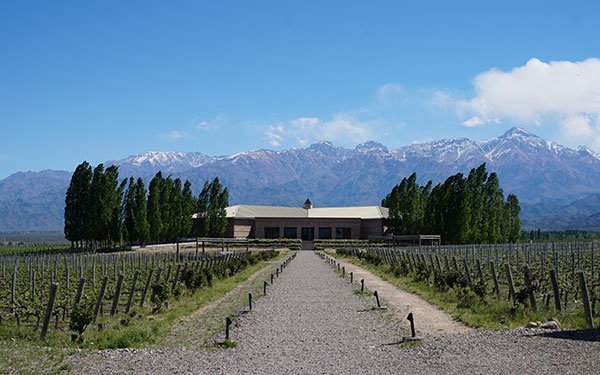
Bariloche
On arriving at Bariloche you might think you’ve found paradise.
This small city boasts an astounding location amongst rugged mountains and strings of azure lakes perfect for hiking, kayaking, rafting, horse riding, and trout fishing.
It’s also the place to come for the most delicious chocolate in Argentina, and in winter it transforms into a top ski destination.
Rosario
Often overlooked as a destination, Rosario — the birthplace of Che Guevara no less — is an energetic riverside port city where business is booming.
The impressive Parana River serves as a major point of export for Argentinian goods, which has resulted in a wealthy, culturally rich city bursting with museums and galleries, excellent restaurants and bars, river beaches, and a great live music scene.
Jobs in Argentina for British Expats
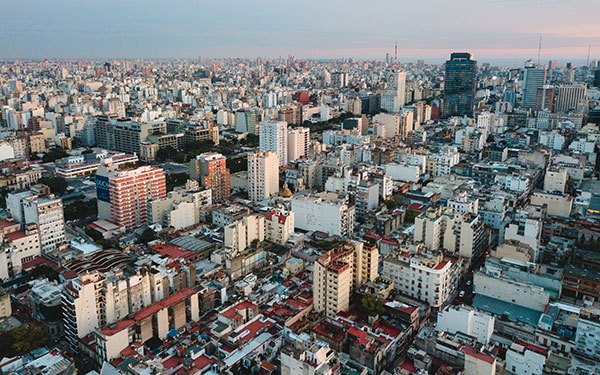
Finding work in Argentina isn’t easy, but there are some great opportunities beginning to open up for skilled expats.
Teaching English as a foreign language is one option, but tends to be low paid.
However if you’re skilled in one of the top industries such as oil, banking and finance, or IT, you may stand a chance of getting a good wage working for one of the many international companies in the major cities.
And, of course, if you speak Spanish it will give you an advantage over the rest.
Are you considering a move to Argentina from the UK?

